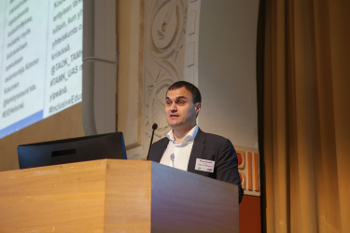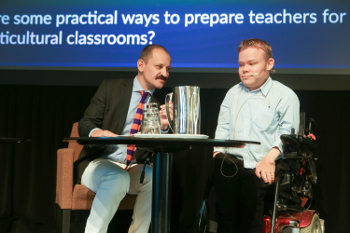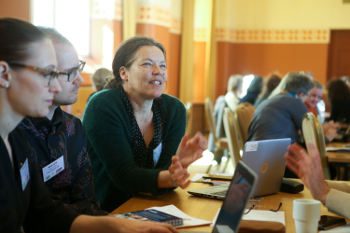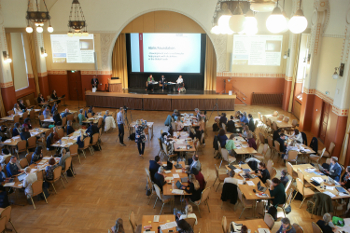”We need to see a change in attitudes towards including everyone” – education experts around the world gathered in Helsinki to discuss education in emergencies
Finn Church Aid, University of Helsinki and Inter-agency Network for Education in Emergencies (INEE) had the honor to host the first ever high-level Education in Emergencies -seminar in Finland on 14th May. Education experts around the world gathered in Helsinki to discuss how education in emergency settings could be made more accessible for all, and how we could step up our efforts to achieve sustainable development goals on time.
It has been widely agreed that sustainable development goals, SDG’s, cannot be achieved by 2030 without ensuring access to quality education for all. Nevertheless, the reality on the ground is still very different from the ideals set out in policy papers, not to mention emergency settings, where inclusive education is far from the targets.
Manos Antoninis, the director for the Global Education Monitoring Report at UNESCO, was one of the renowned education experts who shared his insights in Helsinki on how we could better plan and implement inclusive education programs in emergency settings, if we are to achieve sustainable development goals by 2030. According to him, inclusion should be seen as an inherent and cross-cutting element in all education programs.

Manos Antoninis delivering a key note speech on why we won’t reach SDG4 without inclusive education.
”Inclusive education needs to be seen as a general approach. We need to see a change in attitudes, beliefs and values towards including everyone in education, only then we have actually genuinely achieved SDG4”, Antoninis stated in his key note speech at the beginning of the seminar.
For the moment, only two percent of girls in the lowest income countries complete secondary education. As outlined in the Agenda 2030, by year 2030 we should live in a world where all girls and boys complete secondary education.
”It is not going to be possible, unless something dramatic changes”, Antoninis continues. ”We still face remarkable challenges, when it comes to e.g. learning environments; 1 in 4 schools in sub-Saharan Africa do not have any sanitation facilities, which is a major obstacle for girls to complete school.”
”Nothing about us without us”
First of all, what does it actually mean that education should be inclusive?
By UNESCO’s definition, inclusive education is “a process of addressing and responding to the diversity of needs of all learners through increasing participation in learning, cultures and communities, and reducing exclusion from education and from within education.”
In practice, this means that different needs, such as those originating from disabilities, language, gender or age, should be taken into account and addressed when planning and implementing education activities.
Tuomas Tuure, Development Coordinator at the Threshold Association, shared his insights on addressing the needs of disabled people in planning and implementation of education activities.

Peter Hyll-Larsen and Tuomas Tuure.
”In no other group is participatory approach as important as with people with disabilities. Even in countries like Finland, disabled people themselves participate surprisingly little in decisions concerning their policies, their way of life or even their own lives. This is a group where participation is actually the key” Tuure stressed.
According to Tuure, we should first and foremost acknowledge that when it comes to people with disabilities, the best knowledge comes from disabled people themselves. Furthermore, it comes particularly from people with disabilities in that particular area and context.
On the right track with the SDG’s
Susan Nicolai, Acting Head of Programme at Overseas Development Institute (ODI), pointed out the essential difference between Millennium Development Goals (MDG’s) and Sustainable Development Goals (SDG’s) from the point of view of inclusion; during the era of the MDG’s, the levels of inequality rose, whereas the ambition of the SDG’s is more transformational.
”The MDG’s showed significant progress on a range of issues and education, however, when one looks behind the numbers in terms of where progress occurred, the gains went to those who were more well-off. On the contrary, the ambition of the SDG’s is genuinely transformational; they explicitly make a commitment to the focus on ’Leave no one behind’”, Nicolai underlined.
It can be concluded that progress has been made, but a lot of work remains to be done in order to include everyone.
Turning the crisis into an opportunity by providing youth vocational education
Tomi Järvinen, director for International Cooperation at Finn Church Aid, stressed the importance of vocational training and accredited education as a way of including youth who are living in crisis-affected areas.

Seminar participants discussing in buzz groups.
”In every crisis there is also an opportunity. Waithood can become an opportunity to gain a skill, even a degree, that will then lead to an opportunity in the future”, Järvinen stated while stressing that we need to find new ways of giving young people relevant vocational training in refugee settings.
Furthermore, while introducing an example of accredited education provision in a refugee context, FCA College, Järvinen stressed that we need to emphasize that when possible, education should be accredited in order to provide access to lifelong learning.
”Continuous learning is also a life-saving activity. We need to focus on the quality and relevance of education, not only access”, Järvinen concluded.
Finally, Satu Santala, Director General at the Department of Development Policies at Ministry for Foreign Affairs in Finland, presented the key recommendations of the ”Stepping up Finland’s Global Role in Education” -report, which was prepared last year as a commission of the Ministry for Foreign Affairs by Dr. Ritva Reinikka, Professor Hannele Niemi and Mr. Jukka Tulivuori.
The report recommends that Finland takes a more active role in addressing the learning crisis in developing countries.

The seminar took place in Paasitorni, Helsinki.
”Finland has one of the best education systems in the world, but we haven’t really cracked the nut on how we can share this expertize, and how we can do more and deeply engage with international partners on sharing our own experience”, Santala said.
Finland has a lot of education expertize in the form of research institutions, authorities, civil society and private companies, however, more cooperation and partnerships are needed in order to put all that knowledge into use.
Nonetheless, Santala is optimistic about the way forward.
”There is a strong uptake within the Finnish society for this topic. We have made the report very visibly heard and we have a good sense that it has been well picked up. Now it is very much upto the new government – it remains to be seen how much they will be ready to devote to global development.”
Text: Elina Kostiainen
If you missed the seminar, watch it here.
Links to individual sessions:
Welcome and introductions, Jouni Hemberg, FCA; Arto Kallioniemi, University of Helsinki; Dean Brooks, INEE
https://youtu.be/iNBeMkyHFTY?t=941
Introduction to opening roundtable
https://youtu.be/iNBeMkyHFTY?t=1608
KEYNOTE: Manos Antoninis – “Why we won’t reach SDG4 without Inclusive Education”
https://youtu.be/iNBeMkyHFTY?t=1803
KEYNOTE: Susan Nicolai – “Why we won’t reach SDG4 without Education in Emergencies”
https://youtu.be/iNBeMkyHFTY?t=2889
EXAMPLE: Bente Sandal-Aasen – “Using INEE Minimum Standards and tools for connecting EiE and the SDGs”
https://youtu.be/iNBeMkyHFTY?t=3776
Inclusive education in emergencies – Challenges and solutions
https://youtu.be/iNBeMkyHFTY?t=4037
KEYNOTE: Kimmo Kosonen – “Language in Education in Emergencies”
https://youtu.be/iNBeMkyHFTY?t=4192
EXAMPLE from the field by Barbara Moser-Mercer, InZone Geneva
https://youtu.be/iNBeMkyHFTY?t=5031
KEYNOTE: Tuomas Tuure – “Disability in Education in Emergencies”
https://youtu.be/iNBeMkyHFTY?t=6509
EXAMPLE from the field by Gregory St. Arnold, Jesuit Refugee Services
https://youtu.be/iNBeMkyHFTY?t=7665
EXAMPLE from the field by Ronit Cohen, Safe the Children
https://youtu.be/iNBeMkyHFTY?t=8114
KEYNOTE: Tomi Järvinen – “Youth in Education in Emergencies”
https://youtu.be/iNBeMkyHFTY?t=9313
EXAMPLE from the field by Sonia Gomez, Norwegian Refugee Council
https://youtu.be/iNBeMkyHFTY?t=10247
PANEL DISCUSSION: “Inclusive Education in Education in Emergencies”
https://youtu.be/iNBeMkyHFTY?t=15663
PRESENTATION of Finland’s Stepping Up report by Satu Santala, Finnish MFA
https://youtu.be/iNBeMkyHFTY?t=21026
PANEL DISCUSSION: “Stepping up commitments for inclusive education in emergencies – the role of funders, governments and agencies”
https://youtu.be/iNBeMkyHFTY?t=21675
CLOSING: Jouni Hemberg, FCA